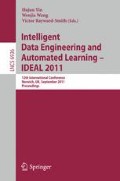Abstract
In this paper, the performance of human subjects is compared with genetic programming in trading. Within a kind of double auction market, we compare the learning performance between human subjects and autonomous agents whose trading behavior is driven by genetic programming (GP). To this end, a learning index based upon the optimal solution to a double auction market problem, characterized as integer programming, is developed, and criteria tailor-made for humans are proposed to evaluate the performance of both human subjects and software agents. It is found that GP robots generally fail to discover the best strategy, which is a two-stage procrastination strategy, but some human subjects are able to do so. An analysis from the point of view of cognitive psychology further shows that the minority who were able to find this best strategy tend to have higher working memory capacities than the majority who failed to do so. Therefore, even though GP can outperform most human subjects, it is not “human-competitive” from a higher standard.
Access this chapter
Tax calculation will be finalised at checkout
Purchases are for personal use only
Preview
Unable to display preview. Download preview PDF.
References
Smith, V.L.: An Experimental Study of Competitive Market Behavior. Journal of Political Economy 70(2), 111–137 (1962)
Furuhata, M., Perrussel, L., Thévenin, J.-M., Zhang, D.: Experimental Market Mechanism Design for Double Auction. In: Nicholson, A., Li, X. (eds.) AI 2009. LNCS, vol. 5866, pp. 1–10. Springer, Heidelberg (2009)
Gjerstad, S.: The Strategic Impact of Pace in Double Auction Bargaining. In: IEDAS, http://129.3.20.41/eps/mic/papers/0304/0304001.pdf
Deshmukh, K., Goldberg, A.V., Hartline, J.D., Karlin, A.R.: Truthful and Competitive Double Auctions. In: Möhring, R.H., Raman, R. (eds.) ESA 2002. LNCS, vol. European Symposium on Algorithms, p. 361. Springer, Heidelberg (2002)
Rust, J., Miller, J., Palmer, R.: Behavior of Trading Automata in a Computerized Double Auction Market. In: Friedman, D., Rust, J. (eds.) Double Auction Markets: Theory, Institutions, and Laboratory Evidence. Addison Wesley, Redwood City (1993)
Rust, J., Miller, J., Palmer, R.: Characterizing Effective Trading Strategies: Insights from a Computerized Double Auction Tournament. Journal of Economic Dynamics and Control 18, 61–96 (1994)
Ariely, D., Norton, M.I.: Psychology and Experimental Economics: A Gap in Abstraction. Current Directions in Psychological Science 16(6), 336–339 (2007)
Chen, S.H., Tai, C.C., Yang, L.X., Shih, K.C.: The Significance of Working Memory Capacity in Double Auction Markets: Modeling, Simulation and Experiments. In: The 2011 Allied Social Sciences Association Meetings, January 6-9. Denver, Colorado (2011)
Chen, S.H., Yu, T.: Agents Learned, but Do We? Knowledge Discovery Using the Agent-based Double Auction Markets. Front. Electr. Electron. Eng. 6(1), 159–170 (2011)
Koza, J.R., Keane, A.M., Streeter, M.J., Mydlowec, W., Yu, J., Lanza, G.: Genetic Programming IV: Routine Human-Competitive Machine Intelligence. Kluwer Academic Publishers, Dordrecht (2003)
Xia, M., Stallaert, J., Whinston, A.B.: Solving the Combinatorial Double Auction Problem. European Journal of Operational Research 164, 239–251 (2005)
Lewandowsky, S., Oberauer, K., Yang, L.-X., Ecker, U.K.H.: A Working Memory Test Battery for MatLab. Behavior Research Methods 42(2), 571–585 (2011)
Author information
Authors and Affiliations
Editor information
Editors and Affiliations
Rights and permissions
Copyright information
© 2011 Springer-Verlag Berlin Heidelberg
About this paper
Cite this paper
Shu-Heng, C., Kuo-Chuan, S. (2011). Is Genetic Programming “Human-Competitive”? The Case of Experimental Double Auction Markets. In: Yin, H., Wang, W., Rayward-Smith, V. (eds) Intelligent Data Engineering and Automated Learning - IDEAL 2011. IDEAL 2011. Lecture Notes in Computer Science, vol 6936. Springer, Berlin, Heidelberg. https://doi.org/10.1007/978-3-642-23878-9_15
Download citation
DOI: https://doi.org/10.1007/978-3-642-23878-9_15
Publisher Name: Springer, Berlin, Heidelberg
Print ISBN: 978-3-642-23877-2
Online ISBN: 978-3-642-23878-9
eBook Packages: Computer ScienceComputer Science (R0)

